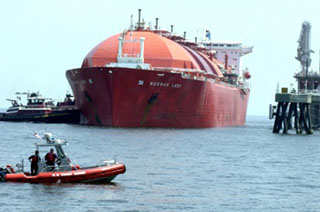Mariners who need to learn about working with liquefied natural gas have tiers of training to choose from, depending on their jobs and responsibilities, as defined by regulations and guidance developed by the International Maritime Organization and U.S. Coast Guard.
The requirements are spelled out in two international codes coming into force in January 2017: the International Convention on Standards of Training, Certification and Watchkeeping for Seafarers (STCW), and the International Code of Safety for Ships using Gases or other Low-flashpoint Fuels (IGF). They specify mariners responsible for designated safety duties associated with the care, use or in emergency response to the fuel on board vessels using LNG as fuel must undergo at least basic training.
The first step – call it entry-level – is learning a basic understanding of LNG’s physical characteristics and chemistry. Then comes learning the hazards, how to anticipate and prevent them, and preventing and mitigating fuel spills. With it comes learning the basics of LNG propulsion, and safe procedures for bunkering LNG fuel – perhaps the most important change of mindset and practice.
Those are the basics for anyone working on an LNG-fueled vessel. Advanced levels of training go with more responsibility. Training centers offer course for licensed deck and engineering officers, terminal workers and engineers and designers who will draw up plans for the vessels and shoreside facilities using LNG.
For workboat operators using the new fuel, the U.S. Maritime Resources Center offers a tailored “LNG Person in Charge (PIC) Bunkering Course” for workers who supervise fueling operations. The course covers:
- Introduction to LNG and the carriage of LNG as a marine fuel.
- Characteristics of LNG, LNG hazards, safety, fire and pollution prevention, overview of LNG propulsion.
- Hands-on LNG safety and fire response training at the Massachusetts Firefighting Academy.
- PIC responsibilities and procedures during transfer.
- Simulation and assessment of PIC students’ performance.




